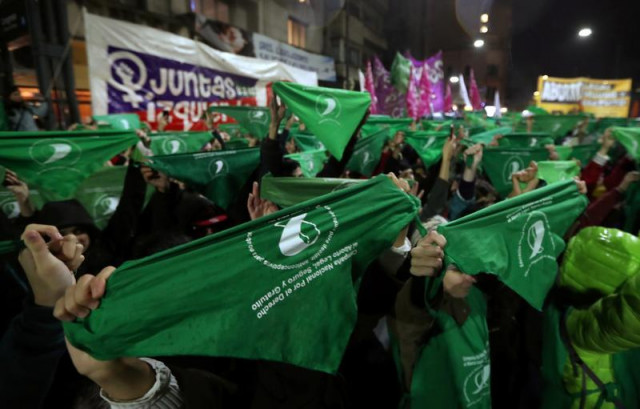Activists in Argentina launch new bid to legalise abortion
In Argentina, abortion is only allowed in case of rape, threat to the mother's life or if fetus is deemed non-viable

Demonstrators hold up green handkerchiefs during a demonstration in favor of legalising abortion outside the Congress in Buenos Aires, Argentina, PHOTO: REUTERS.
A vast crowd -- mostly young women dressed in green, the color that has come to symbolise their movement -- gathered outside the Congress building in central Buenos Aires since early evening to support the bill.
Last year, a bill to decriminalise abortion up to the 14th week of pregnancy was narrowly adopted by the Chamber of Deputies but defeated in the Senate, under strong pressure from the still-powerful Catholic Church.
The new bill is being put forward by 15 lawmakers from a range of parties, including President Mauricio Macri's ruling center-right Cambiemos coalition and left-wing opposition parties.
The protesters plan to hold a major demonstration into the night to mark the revival of their campaign, hoping for a better ending this year. Similar protests were planned for cities and towns across Argentina.
"Everyone has to be able to decide responsibly. Abortion is not easy, but there has to be legislation that allows them to do it with dignity," tourist guide Noelia Patruno, 40, told AFP.
In the corner of the square, a smaller group of anti-abortion activists struggled to make themselves heard.
"A society that proposes death is not a fair one. Life begins at conception," said Nelida Rodriguez, a 50-year-old store owner wearing a blue scarf to signify the anti-abortion movement. "Why come back with a bill when it was rejected last year?"
Victoria Tesoriero, leader of the Campaign for the Right to Legal, Safe and Free Abortion, said activists would keep the pressure on lawmakers ahead of the election, in which a third of Senate seats and half of those in the lower house will be contested.
"Presenting the new bill is not only a return to the offensive for abortion rights, but to put pressure on the party lists to make sure that every candidate clearly states their preference," said Tesoriero.
The bill is unlikely to return to the Senate before the end of this year, given the elections, observers say.
In raucous scenes outside Congress last August, abortion rights campaigners wept and hugged, while fireworks and shouts of joy erupted among anti-abortion activists as the Senate's defeat of the measure was announced.
"This time, the issue is already well embedded in society," said Tesoriero. "It will be a more natural question for candidates, who will have to say what position they will take to Congress."
In Argentina, abortion is only allowed in case of rape, a threat to the mother's life or if the fetus is deemed non-viable.
But many doctors and some provincial governments are reluctant to apply the law, recently forcing an 11-year-old rape victim to continue her pregnancy, debating the issue until the legal window for an abortion had passed.
Authorities who refused to allow the family's demand for an abortion eventually allowed a cesarean section to be carried out at 23 weeks.
The pope, a former archbishop of Buenos Aires, last year compared having an abortion to hiring a "contract killer."
"Getting rid of a human being is like resorting to a contract killer to solve a problem," Francis said in an address to worshippers at the Vatican in October.
Various charities estimate that 500,000 illegal, secret abortions are carried out every year in Argentina, resulting in the deaths of about 100 women.
Amnesty International said the bill was a new opportunity to guarantee women's rights in a country where abortions continued to be carried out in "deplorable conditions."
The campaign has gained international visibility with the airing of a documentary by Argentine director Juan Solanas at the Cannes Film Festival last week, where Spanish director Pedro Almodovar and actress Penelope Cruz showed their support by wearing green scarves.
Following its legalisation in once-conservative Ireland last year, the renewed push in Argentina comes amid efforts by some Republican-led states in the United States to row back on abortion, legal nationwide since 1973.
Earlier this month, the US state of Alabama signed the most restrictive abortion law in the country, providing for a near-total prohibition, even in cases of rape and incest.
The states of Kentucky, Mississippi and Missouri have also tightened their abortion laws.
The state bans have so far either been blocked by a judge or are headed for the courts.



















COMMENTS
Comments are moderated and generally will be posted if they are on-topic and not abusive.
For more information, please see our Comments FAQ